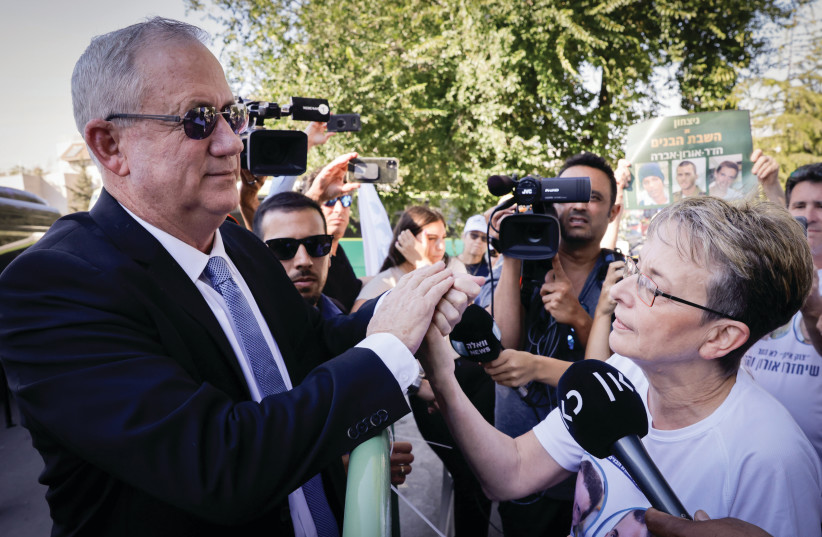When was the last time you thought of Avera Mengistu or Hisham al-Sayed? Do their names even ring a bell?
Based on the attention given to them over the last seven years, it’s totally excusable that they’re not in anyone’s bandwidth. And that’s tragic.
Ashkelon resident Mengistu, originally from Ethiopia, entered the Gaza Strip in September 2014. Sayed, from the Bedouin town of al-Hura in the Negev, entered Gaza in April 2015. Both Israelis suffer from mental illness, which is thought to have contributed to their crossing into Gaza, controlled by Hamas, Israel’s sworn enemy.
Hamas is understood to be holding the two Israeli civilians captive ever since. Until Tuesday, that assumption was impossible to confirm since the terrorist organization had not officially disclosed that they are keeping them prisoners, nor has their leadership allowed any international body, such as the Red Cross, to visit them and assess their mental and physical state.
In addition, Hamas is also believed to be holding the remains of two soldiers killed in 2014 during Operation Protective Edge: Lt. Hadar Goldin and Sgt. Oron Shaul.

There has not been any outcry from human-rights organizations, which are generally quick to target Israel with any perceived infringement on the rights of Palestinians. Nor have there been the public protests in Israel that would put the two Israelis on the national agenda, along the lines of the campaigns that accompanied Gilad Schalit’s imprisonment and contributed to the eventual prisoner swap that led to his release in 2011 after five and a half years of captivity in Gaza.
“We have two civilians and two [dead] soldiers who are there, and this needs to always be in front of our eyes,” he told KAN News. “We need to do everything to return them.”
National Security Council official, referred to as “Maoz”
Mengistu and Sayed seem to have fallen beneath the radar. That was until Monday, when Hamas returned the issue to the limelight. The health of one of the Israeli captives had deteriorated, said Abu Obedia, spokesman for Izzadin al-Qassam Brigades, the so-called military wing of Hamas. He promised “confirmation” of the claim.
That confirmation came Tuesday afternoon, when Hamas released video footage of Sayed lying on a bed with an oxygen mask attached to a tank. His ID card is seen. It appears that the video is legitimate. The question is why is Hamas releasing it now?
As Tovah Lazaroff reported, statements about the welfare of hostages are often viewed in Israel as psychological warfare on the part of the terrorist group.
PM's response to the announcement
The Hamas announcement was worrisome and should be taken seriously, said Moshe Tal, formerly the IDF chief of staff’s representative for dealing with captives and missing soldiers at the Prime Minister’s Office. There is a possibility that the notice was purely psychological propaganda, but his hunch was that it was legitimate, he told KAN News on Tuesday, hours before the video was released. A third option was that Hamas was trying to raise the issue in an attempt to engage Israel in indirect discussions on a prisoner swap or other gains it could achieve by releasing one or both of the Israelis, he said.
However, the Prime Minister’s Office responded to the Hamas announcement Monday night as if the first option was the only motive.
“Hamas has proven tonight that it is a cynical and criminal terrorist organization, which holds mentally ill civilians in violation of all international conventions and laws, as well as the bodies of IDF soldiers,” it said in a statement. “Hamas is the one responsible for the welfare of the civilian captives. The State of Israel will continue its efforts, mediated by Egypt, to restore the captives and the missing responsibly and with determination.”
According to Tal, Israel has not done enough in exploring opportunities to free Mengistu and Sayed.
Prisoner-swap
Earlier this month, a former National Security Council official, referred to as “Maoz,” said Israel had been “very close” to reaching a prisoner-swap agreement.
“We have two civilians and two [dead] soldiers who are there, and this needs to always be in front of our eyes,” he told KAN News. “We need to do everything to return them.”
If Monday’s Hamas announcement and Tuesday’s video release do anything, maybe they will bring Mengistu and Sayed to the public eye and prompt the government to continue to explore all possibilities for achieving a deal to free them from captivity after so many years. If Sayed is indeed seriously ill, as Hamas claims, time is of the essence.
We owe it to him and Mengistu, and to our national collective consciousness that takes responsibility for the well-being of fellow Israelis.
